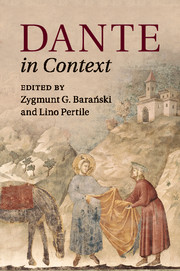Book contents
- Frontmatter
- Dedication
- Contents
- List of illustrations
- List of maps
- Notes on contributors
- Chronology
- Abbreviations and note on translations
- Introduction
- Part I Politics and society
- Part II Intellectual traditions
- Part III Linguistic and literary cultures
- 15 Linguistic Italy
- 16 Education
- 17 Rhetoric, literary theory, and practical criticism
- 18 Classical antiquity
- 19 Religious culture
- 20 Visions and journeys
- 21 Historical and political writing
- 22 Vernacular literatures
- 23 Popular culture
- Part IV Visual and performative culture
- Part V Dante: life, works, and reception
- Further reading
- Index
22 - Vernacular literatures
from Part III - Linguistic and literary cultures
Published online by Cambridge University Press: 05 October 2015
- Frontmatter
- Dedication
- Contents
- List of illustrations
- List of maps
- Notes on contributors
- Chronology
- Abbreviations and note on translations
- Introduction
- Part I Politics and society
- Part II Intellectual traditions
- Part III Linguistic and literary cultures
- 15 Linguistic Italy
- 16 Education
- 17 Rhetoric, literary theory, and practical criticism
- 18 Classical antiquity
- 19 Religious culture
- 20 Visions and journeys
- 21 Historical and political writing
- 22 Vernacular literatures
- 23 Popular culture
- Part IV Visual and performative culture
- Part V Dante: life, works, and reception
- Further reading
- Index
Summary
Dante wrote the Vita nova around 1292–95, and included in it poems written previously at dates difficult to establish. Around the same time Guiraut Riquier (b. c.1230), the last of the troubadours, died (1292); Guittone d'Arezzo (b. c.1235) died soon after (1294), as did Brunetto Latini (1293; b. c.1220). The composition of the Vita nova fell between the death of Guido Guinizzelli (1276; b. c.1230) and that of Guido Cavalcanti (1300; b. 1250/59). Also during those two decades the Libro di cento novelle (Book of One Hundred Tales), better known as Il novellino, the first major work in prose written in an Italian vernacular, was composed. Dante's entry into the literary scene took place at a time of generational and cultural change of which the poet was a pivotal cause and protagonist.
By the time the Vita nova began to circulate towards the end of the Duecento, the literary panorama of the Italian peninsula had altered into being indisputably ‘Italian’ in the linguistic sense, abandoning Occitan and Old French as literary languages. The change came about slowly but decisively; nor did it imply the rejection of what had been written before, but rather an adaptation and reassessment of this, otherwise it would be difficult to understand the sudden blossoming of Italian literature, its reaching a peak of excellence in a very short period.
Besides Occitan and Old French, the other language that was primarily written on the Italian peninsula was Latin. The spoken languages were regional forms of the Italian family, but the written documentation in local vernaculars is quite limited, and in any case it is not deemed worthy of being considered ‘literature’ (see Chapter 15).
The birth of Italian literature is strikingly late when compared to its Occitan and Old French counterparts: the earliest troubadours were active around 1100 and the Song of Roland was composed about the same time. This chronological discrepancy has inevitably caused literary historians to wonder why Italian literature began so much later than that of other Romance cultures. One of the problems facing Italians was that whatever language of their own native land they used, this had not reached the formal standardization attained by the languages of the south and north of France.
- Type
- Chapter
- Information
- Dante in Context , pp. 371 - 388Publisher: Cambridge University PressPrint publication year: 2015



